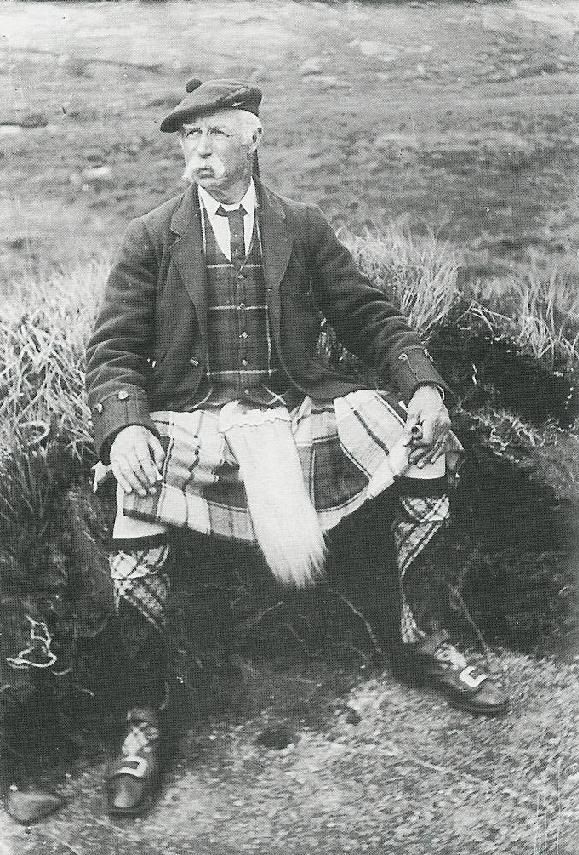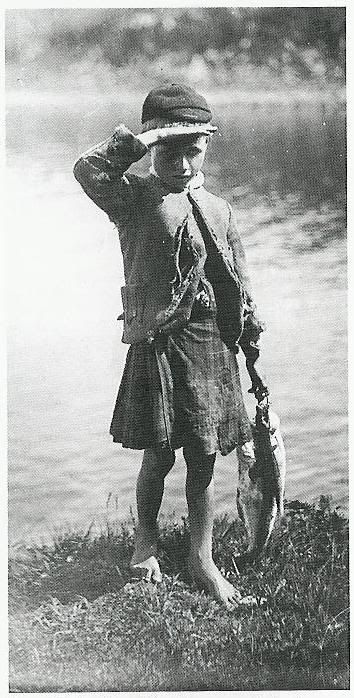|
-
1st February 11, 11:24 PM
#23
 Originally Posted by Drac

Gotta ask, do well made argle (or any patterned sock) really line that well up when cuffed or is that artistic liberties?
 Originally Posted by M. A. C. Newsome

Yes, when you order custom Argyle or diced hose, the pattern on the cuff should line up with the pattern on the sock.
Here's another example, from around 1910:

 Originally Posted by artificer

The book is called:
The Highlanders of Scotland: The Complete Watercolours Commissioned by Queen Victoria from Kenneth MacLeay of her Scottish Retainers and Clansman
the author is Delia Millar.
You'll find, MacGuffin, that this book and topic is a bit of a sore spot for some native Highlanders. The people of the area have had a rather difficult time, financially AND politically over the centuries.
They tend to be rather frustrated (and rightfully so) when people interpret these images as "What the average Highland man wore" rather than "a group of Royal retainers depicted in all their finery by Royal request."
In short, just keep in mind that the men depicted are NOT average men simply going about their day. They are Royal staff or VERY well to do friends of the queen.
Hear! Hear!  
....a bit of background on the prints:
THE QUEEN'S WATERCOLOURS
Scottish Life Magazine - Winter 2003
WHEN QUEEN VICTORIA COMMISSIONED PORTRAITS OF THE HIGHLAND CLANSMEN SHE KNEW AND ADMIRED, SHE UNWITTINGLY CAPTURED A FINAL CHAPTER OF HIGHLAND HISTORY.
Queen Victoria's passion for Highlanders, their language and their dress is well known, but one of the most remarkable aspects of this enthusiasm has been largely forgotten in recent times. In the early summer of 1865, the monarch commissioned from Scottish miniaturist, Kenneth MacLeay, a number of watercolours of her family and retainers at Balmoral Castle in Deeside. After seeing these initial portraits, the Queen then decided to expand the project and have MacLeay paint representatives of the principal Highland clans.
The men in these portraits were chosen by the clan chiefs themselves and are wearing the most authentic tartans, showing in detail the historic insignia and accoutrements of their clans. When the set of 31 watercolours was exhibited in Bond Street, London in 1869, it caused a sensation, and a limited edition printing of the portraits in 1870 is now highly prized.
The relaxed, distinguished men shown by MacLeay give no impression of the difficulties under which many of them grew up -- and were still living. After the 1745 rebellion, the Highland way of life quickly changed. Chiefs became absentee landlords. Lack of work and lack of food moved some landlords to encourage Highlanders to leave their homes, while others were forcibly evicted. The great emigration to the colonies began, further emptying the land. So today, these nearly forgotten portraits, now preserved in the Royal Library at Winsdor Castle, not only provide one of the most authentic pictures of Highland dress, but also give a compelling snapshot of a moment in time -- of a people and a landscape now lost to history.
 Originally Posted by artificer

That said, the images are GORGEOUS, and an excellent record of the fashions the well-positioned could roll out in at the time.
I love these series of prints. They do capture a moment in time, however as has been stated, we must remember that they were in their finest dress, or the dress of gentlemen, not the dress of the average Highlander who chose to wear traditional highland dress.
Here's what one might call a more realistic look at every day rural highland wear during the later half of the 19th century /early 20th century:

Not so romantic a view, eh?
The image is of young Donald MacDonald, of Kinagarry, Arisaig, photographed by Miss M E M Donaldson about 1900-1910. He is dressed in tattered re-made garments representing the twilight of tartan as everyday wear of Highlanders
(from TARTAN by Hugh Cheape).
Having said that, however, I think the Highlanders of Scotland has such a timeless look to it, that it is a great resource to inspire todays traditional kilt wearers. 
[SIZE="2"][FONT="Georgia"][COLOR="DarkGreen"][B][I]T. E. ("TERRY") HOLMES[/I][/B][/COLOR][/FONT][/SIZE]
[SIZE="1"][FONT="Georgia"][COLOR="DarkGreen"][B][I]proud descendant of the McReynolds/MacRanalds of Ulster & Keppoch, Somerled & Robert the Bruce.[/SIZE]
[SIZE="1"]"Ah, here comes the Bold Highlander. No @rse in his breeks but too proud to tug his forelock..." Rob Roy (1995)[/I][/B][/COLOR][/FONT][/SIZE]
-
Similar Threads
-
By Slag101 in forum Historical Kilt Wear
Replies: 10
Last Post: 9th July 10, 06:32 PM
-
By Warlock in forum DIY Showroom
Replies: 6
Last Post: 29th January 07, 07:02 AM
-
By Kilted Archer in forum DIY Showroom
Replies: 6
Last Post: 23rd January 07, 11:11 AM
-
By highlandtide in forum Kilt Advice
Replies: 18
Last Post: 21st June 05, 07:55 AM
-
By Graham in forum Kilts in the Media
Replies: 15
Last Post: 13th September 04, 08:56 AM
 Posting Permissions
Posting Permissions
- You may not post new threads
- You may not post replies
- You may not post attachments
- You may not edit your posts
-
Forum Rules
|
|



















Bookmarks